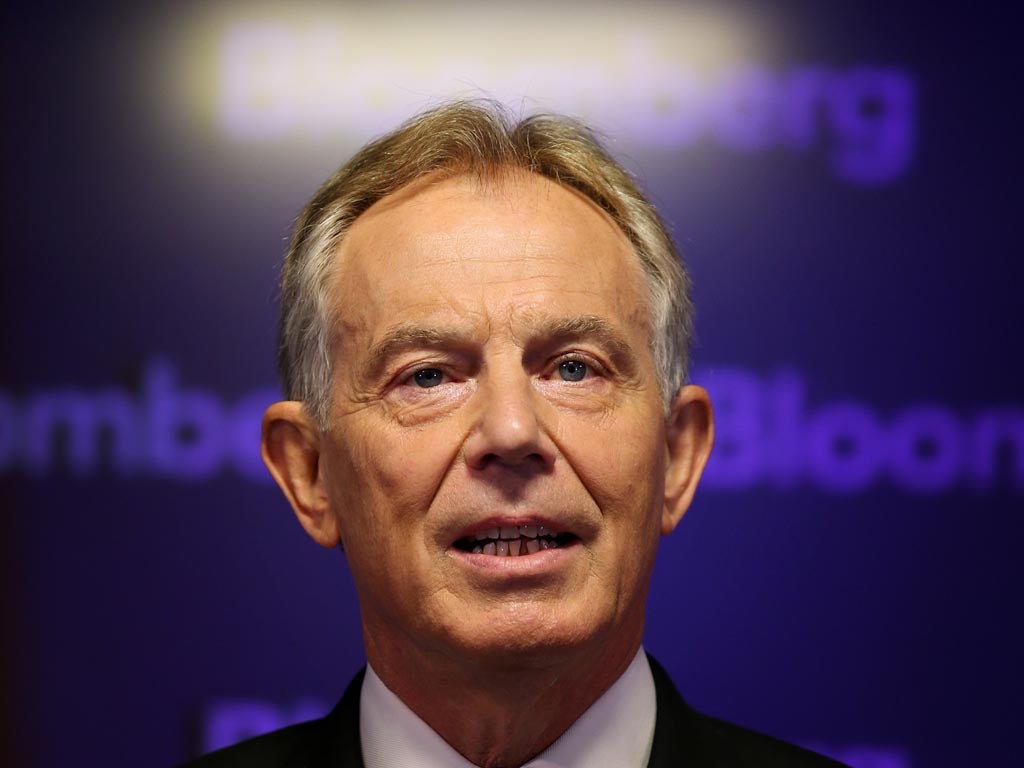Tony Blair: 'Ground troops are necessary to fight Islamic State - diplomacy will not defeat them'
Former PM offered his perspective ahead of UN Security Council meeting

Tony Blair has urged Britain not to rule out sending ground troops to combat the Islamic State (Isis), arguing air strikes are not enough to defeat the terrorist group.
In a 6,500 word essay published on his website, the former Prime Minister said that with the consent of Iraq and Syria and a broad international alliance including Arab countries, David Cameron could avoid the “weaknesses” of Western strategy after September 11th.
Mr Blair, whose political career was defined by his decision to follow America into war in Iraq and Afghanistan, said he fully accepted there is “no appetite” for ground engagement in the West but it may be necessary.
“We have to fight groups like Isis,” he wrote. “There can be an abundance of diplomacy, all necessary relief of humanitarian suffering, every conceivable statement of condemnation which we can muster, but unless they're accompanied by physical combat, we will mitigate the problem but not overcome it…
“You cannot uproot this extremism unless you go to where it originates and fight it.”
Told that people would think he is the last person they should listen to, given the experiences following the Iraq invasion in 2003, Mr Blair replied on BBC Radio 4's Today programme: "What I say is maybe having been through all of this, having faced these decisions in government and having faced the difficult choices in Iraq after 2003, and when the very type of terrorism that we're facing today we faced then, maybe it's worth appreciating the fact that there are lessons I have learnt from the experience of having gone through the process of taking these decisions, of having to deal with the situation in Iraq where, as I say, precisely the same type of terrorist forces we were facing in Iraq in 2006-07 is exactly what we face now in 2014."
His intervention came as David Cameron considers whether to join the US and France launching air strikes on Isis in Iraq and Syria.
The Prime Minister will attend a meeting of the UN Security Council chaired by Barack Obama in New York on Wednesday, where he is expected to outline Britain’s contribution.
Mr Cameron has repeatedly ruled out sending ground troops but not an air campaign.
The Government was initially hesitant to intervene in Iraq as Isis started its bloody campaign to establish an Islamic caliphate earlier this year but the beheading of British aid worker David Haines, following the murders of two American journalists, and threats to the lives of British hostages John Cantlie and Alan Henning changed the debate.
The three brutal killings so far appear to have been carried out by the same British militant, nicknamed “jihadi John”, who is one of up to 500 UK-born fanatics fighting with Isis in Iraq and Syria.
Mr Blair’s biggest criticism of current policy in his essay was the failure to adequately co-ordinate the fight against global Islamist extremism and radicalisation at home.
“Without a comprehensive strategy, we will face a future marked by conflict and instability across swathes of the world and major acts of terrorism in our own lands,” he wrote.
“Action against ISIS alone will not suffice. We need to recognise the global nature of the problem, the scale of it.”
The former Labour leader sought to link violence in Iraq, Syria, Nigeria, Pakistan, Central African Republic and across the world under the broad umbrella of Islamic extremism.
Arguing that there is a "fundamental problem” with radical Islam, he said there were distinct factors in every case but all terrorist groups were based on the same “world view” that is intrinsically hostile towards the West.
“We are right in the immediate term to concentrate on defeating Isis,” he wrote.
“But another Isis will quickly arise to take their place unless we go to the root of the issue and deal with this ideology wherever and however it shows itself on a coordinated global basis.”
He controversially argued that terrorists were not “a weird cult confined to a few fanatics” but part of a global “spectrum of opinion which stretches far further into parts of Muslim society”.
“The truth is that Islamism, unless fundamentally reformed, is incompatible with modern economies and open-minded, religiously pluralistic societies,” he wrote, separating Islamism from Islam itself.
Mr Blair called on the G20 to work on an international charter endorsed by the UN to ensure that education systems prevent radicalisation and religious separatism.
Calling schools and mosques teaching Salafi Wahhabism the “incubators of radicalism”, he said it was “foolish” to allow radicalisation while spending billions to combat the threat it creates.
The former Labour leader, who now runs two foundations, advises foreign Governments and frequently visits the Middle East in his role as Quartet Representative, made frequent references to his time as Prime Minister
“Certainly we made mistakes and for sure our understanding frequently fell short,” he said.
“But now we need to pool our energies and focus our attention, learning from the past so as better to address the future, without a narrow or partisan political debate, without attempts to discredit or decry, but with the combined rigour of analysis and action the situation now urgently demands.”
Several critics did not appreciate Mr Blair’s intervention, taking to Twitter to criticise his record in the Middle East.
“If at first you don't succeed, try, try again eh Tony,” one person quipped.
Another wrote: “Tony Blair - no one, I repeat no one, wants your input.”
Join our commenting forum
Join thought-provoking conversations, follow other Independent readers and see their replies
Comments
Bookmark popover
Removed from bookmarks